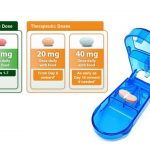Pristiq (Desvenlafaxine): Frequently Asked Questions (FAQs)

What Is Pristiq?
Pristiq is a brand of desvenlafaxine a prescription medication that is FDA approved for the treatment of major depressive disorder in adults. Desvenlafaxine is in a class of medications called selective serotonin and norepinephrine reuptake inhibitors (SNRIs). It works by increasing the amounts of serotonin and norepinephrine, natural substances in the brain that help maintain mental balance.
How long has Pristiq (desvenlafaxine) been available?
Pristiq (desvenlafaxine) has been available for over 10 years. It was FDA approved for the treatment of major depressive disorder (MDD) in adults in February of 2008.
How can Pristiq (desvenlafaxine) help treat depression?
Pristiq (desvenlafaxine) is an effective treatment for depression in adults. It’s proven to relieve the emotional and physical symptoms of depression as measured by the HAM-D17, a commonly used symptom rating scale.
In clinical studies, Pristiq (desvenlafaxine) 50 mg also helped improve patients’ ability to function according to a scale* used to measure how depression disrupts work, social life/leisure activities, and family life/home responsibilities.
*Sheehan Disability Scale (a validated measure of functional impairment) total score for Pristiq (desvenlafaxine) vs placebo.
Is Pristiq (desvenlafaxine) good for anxiety?
Pristiq (desvenlafaxine) is not FDA-approved to treat anxiety. It is sometimes used as an off-label (not approved) medication for generalized anxiety, social anxiety, and panic attacks. Talk to your healthcare provider about whether this medication is the right fit for you, especially if you also have symptoms of depression.
Is it better to take Pristiq (desvenlafaxine) in the morning or at night?
Pristiq (desvenlafaxine) can be taken at any time during the day. If it makes you feel drowsy, you can take it at bedtime. Just be sure to take it around the same time every day for the most consistent results.
How long should I continue taking Pristiq (desvenlafaxine)?
Continue taking Pristiq (desvenlafaxine) as prescribed by your doctor, even if you’re feeling better. Don’t stop taking your medication without first talking with your doctor. Together, you can determine how long you should continue taking Pristiq (desvenlafaxine).
Side effects may occur when stopping Pristiq (desvenlafaxine) (discontinuation symptoms), especially when therapy is stopped suddenly. Your doctor may want to decrease your dose slowly to help avoid side effects. Examples of withdrawal symptoms that can occur if you suddenly stop taking Pristiq includes:
- nausea
- sweating
- dizziness
- headache
- feeling irritable or agitated
- anxiety
- confusion
- diarrhea
- feeling pins and needles or having electric shock sensations
- tinnitus (ringing or other noise in your ears)
- insomnia (trouble sleeping)
- abnormal dreams
- tremor
- seizures
- changes in your mood
- low level of physical or mental energy
Who should not take Pristiq (desvenlafaxine)?
Do not take Pristiq (desvenlafaxine):
• If you are allergic to desvenlafaxine, venlafaxine, or any of the ingredients in Pristiq (desvenlafaxine)
• If you currently take, or have taken within the last 14 days, an MAOI (monoamine oxidase inhibitor) including intravenous methylene blue or the antibiotic linezolid
• It is also important to know that you should not take an MAOI within 7 days of stopping Pristiq (desvenlafaxine).
Can you drink on Pristiq (desvenlafaxine)?
You shouldn’t drink alcohol while you’re taking Pristiq (desvenlafaxine). Drinking alcohol can increase your risk of having side effects from Pristiq. These side effects include:
• feeling sleepy
• dizziness
• having sexual problems
Drinking alcohol can also make your depression symptoms worse. If you drink alcohol, talk with your doctor about whether it’s safe for you to continue drinking while you’re taking Pristiq (desvenlafaxine).
Can I take Pristiq (desvenlafaxine) with other medications?
It’s important to remember, do not take Pristiq (desvenlafaxine) if you:
• Currently take, or have taken within the last 14 days, any medicine known as an MAOI (including intravenous methylene blue or the antibiotic linezolid)
• Allow 7 days after stopping Pristiq (desvenlafaxine), before
• starting an MAOI.
• Taking an MAOI with Pristiq (desvenlafaxine) can cause serious or even life-threatening side effects
• Are taking medicines containing venlafaxine or desvenlafaxine
Before taking Pristiq (desvenlafaxine), tell your doctor about all prescription and over-the-counter medications and supplements you take or plan to take including:
• Those to treat migraines or psychiatric disorders (including other antidepressants or amphetamines) to avoid serotonin syndrome, a potentially life-threatening condition
• Aspirin, NSAID pain relievers, or blood thinners, because they may increase the risk of bleeding
What should I avoid while taking Pristiq (desvenlafaxine)?
Until you see how Pristiq (desvenlafaxine) affects you, you should avoid driving a car or operating machinery. You should also avoid drinking alcohol when taking Pristiq (desvenlafaxine).
What are the most common side effects of Pristiq (desvenlafaxine)?
While the goal of taking Pristiq (desvenlafaxine) is to feel better, it’s important to know that everyone responds differently to medication. And when it comes to antidepressants, there are side effects. Many people shy away from antidepressants due to side effects. It can take time to find the right medication for you.
You and your doctor can determine if the benefits of treatment outweigh the burden of side effects. Always discuss any side effects you are experiencing with your doctor.
In clinical studies, the most common side effects with Pristiq (desvenlafaxine) 50 mg were:
• Nausea
• Dizziness
• Sweating
• Constipation
• Decreased appetite
These are not all the possible side effects of Pristiq (desvenlafaxine). For a complete list of side effects, please see Section 6 of the full Prescribing Information.
If you’re concerned about side effects, talk to your doctor.
Will I gain weight while taking Pristiq (desvenlafaxine)?
While people react differently to Pristiq (desvenlafaxine), clinical studies have shown no significant difference in average weight gain versus placebo. Side effects may increase at higher doses. Data based on short-term studies and a 6-month phase of a long-term study of patients who responded to Pristiq (desvenlafaxine). Individual results may vary.
Will Pristiq (desvenlafaxine) affect my sex drive?
While people react differently to Pristiq (desvenlafaxine), clinical studies have shown that there was a low rate of sexual side effects in men and women taking Pristiq (desvenlafaxine) 50 mg, similar to those who took a placebo. Sexual side effects include decreased sex drive, as well as delayed orgasm and ejaculation. Side effects may increase at higher doses. Data based on short-term studies and a 6-month phase of a long-term study of patients who responded to Pristiq (desvenlafaxine). Individual results may vary.





